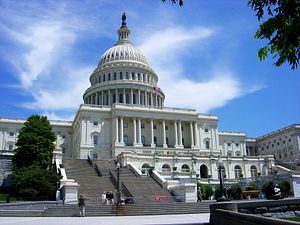June 12 marks the third anniversary of the Singapore Summit, where Donald Trump became the first sitting U.S. president to meet face-to-face with the leader of North Korea. Yet nearly four decades before Trump and Kim Jong Un met, it was a member of the legislative branch who made history as the first sitting U.S. official to visit North Korea and meet with a North Korean leader.
In 1980, Congressman Stephen Solarz from New York met with President Kim Il Sung in North Korea. Kim greeted Solarz by stating, “There is a Korean proverb that beginning is half done. You are the first American politician to visit our country and we feel that you will break the ice.”
When responding to Kim, Solarz presciently anticipated the immense challenges ahead to overcome decades of mistrust between the United States and North Korea: “Listening to that proverb, I’m reminded of something Winston Churchill said during World War II after the battle of El Alemain: ‘This is not the end. It is not even the beginning of the end. But it may, perhaps, be the end of the beginning.’”
Solarz’s visit to North Korea paved the way for dozens of members of Congress and Congressional staff to travel to North Korea in subsequent decades. Those delegations built needed knowledge in the legislative branch about a country that has been one of the most vexing issues in U.S. foreign policy for decades. Given their limited nature and time on the ground in North Korea, these trips by no means provided a policy panacea. Yet they did offer an opportunity for policymakers on the Hill to learn more about North Korea directly, help members of Congress better exercise their oversight functions, and build relationships with North Korean officials that may help gauge their intentions.
However, the number of sitting members of Congress who visited North Korea outside of short visits to the Demilitarized Zone from South Korea is at its lowest number in over two decades. The 116th Congress counted four members who visited: Eliot Engel, Nancy Pelosi, Pat Roberts, and Joe Wilson. In the 117th Congress, only Pelosi and Wilson remain. One unsuccessful candidate for the 117th Congress, Rick Saccone, also spent time in North Korea, though it became a liability on the campaign trail amid allegations he overstated the nature of his experiences there.
Encouraging key Congressional leaders to engage directly with North Korean officials and gain firsthand experience about North Korea can be one facet of a successful strategy following the completion of the Biden administration’s North Korea policy review. While Congressional delegations and staff delegations to North Korea might not be immediately possible given COVID-related travel restrictions and other restrictions put in place by the U.S. Department of State, laying the groundwork for principled and effective direct engagement now may pay dividends later.
This is critical given that the last publicly disclosed visit of a sitting member of the 117th Congress to North Korea was Wilson’s trip in 2003. Much has changed in North Korea in the nearly two decades that have passed; Wilson’s visit took place over eight years before Kim Jong Un became leader of the country and over three years before North Korea’s first nuclear weapons test.
By successfully making Congress a partner in the administration’s North Korea policy, the administration may also help to build trust as well as confidence with the North Koreans that agreements reached in any future negotiations would be sustainable. The North Koreans surely observed Trump’s withdrawal from the Joint Comprehensive Plan of Action (commonly known as the Iran nuclear deal), among other deals, and they are also acutely aware of the fate of Libya’s Muammar Gaddafi, who agreed to give up his weapons of mass destruction program. Demonstrating that agreements are not just subject to the whims of the individual occupying the Oval Office will go a long way in engendering trust and confidence with any negotiating partner. Engaging and empowering Congress can be a step toward this.
In October 2003 as ranking member of the Senate Committee on Foreign Relations, then-Senator Joe Biden spoke about the divisions within the Bush administration on North Korea policy: “[I]t seems to me there should be one voice and one policy coming out of the administration. Prospects for diplomatic solutions are in direct proportion to one voice.” That need to speak with one voice applies to Congress as well. Despite the current political polarization in Congress, some members recognize that North Korea policy still is an area in which bipartisan alignment is possible. The Biden administration will need to be proactive about engaging Congress and encouraging Congress to exercise its oversight role, areas on which the Trump administration sometimes drew criticism during its attempts to engage North Korea.
Biden and Vice President Kamala Harris have roughly four decades of combined experience serving in the United States Senate. That experience comes with extensive personal relationships and a deep understanding of Congress’ oversight role. Both should be leveraged when attempting to align the executive and legislative branches to speak with one voice on this most vexing of foreign policy challenges. Doing so effectively could be one step toward crafting policy that will keep Americans safe, promote peace and prosperity in Northeast Asia, and improve the lives of ordinary North Koreans.

































